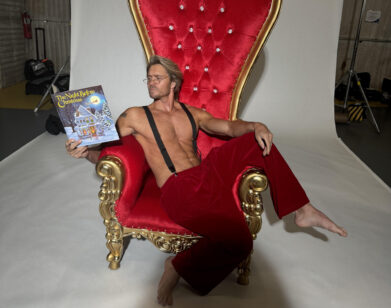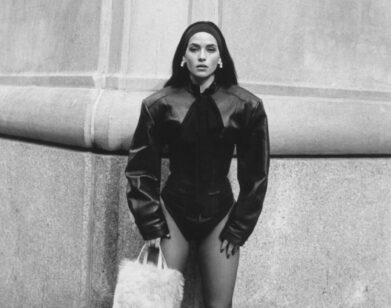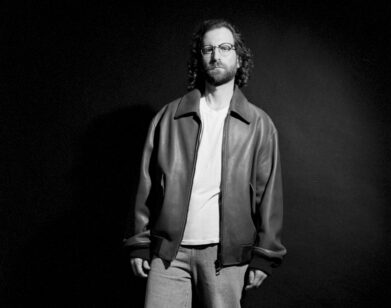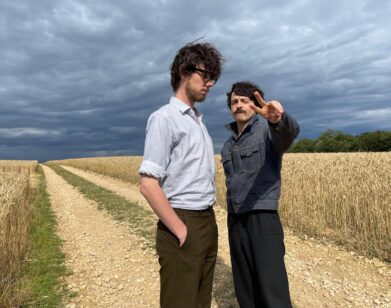Drake Doremus’ Mode and Method
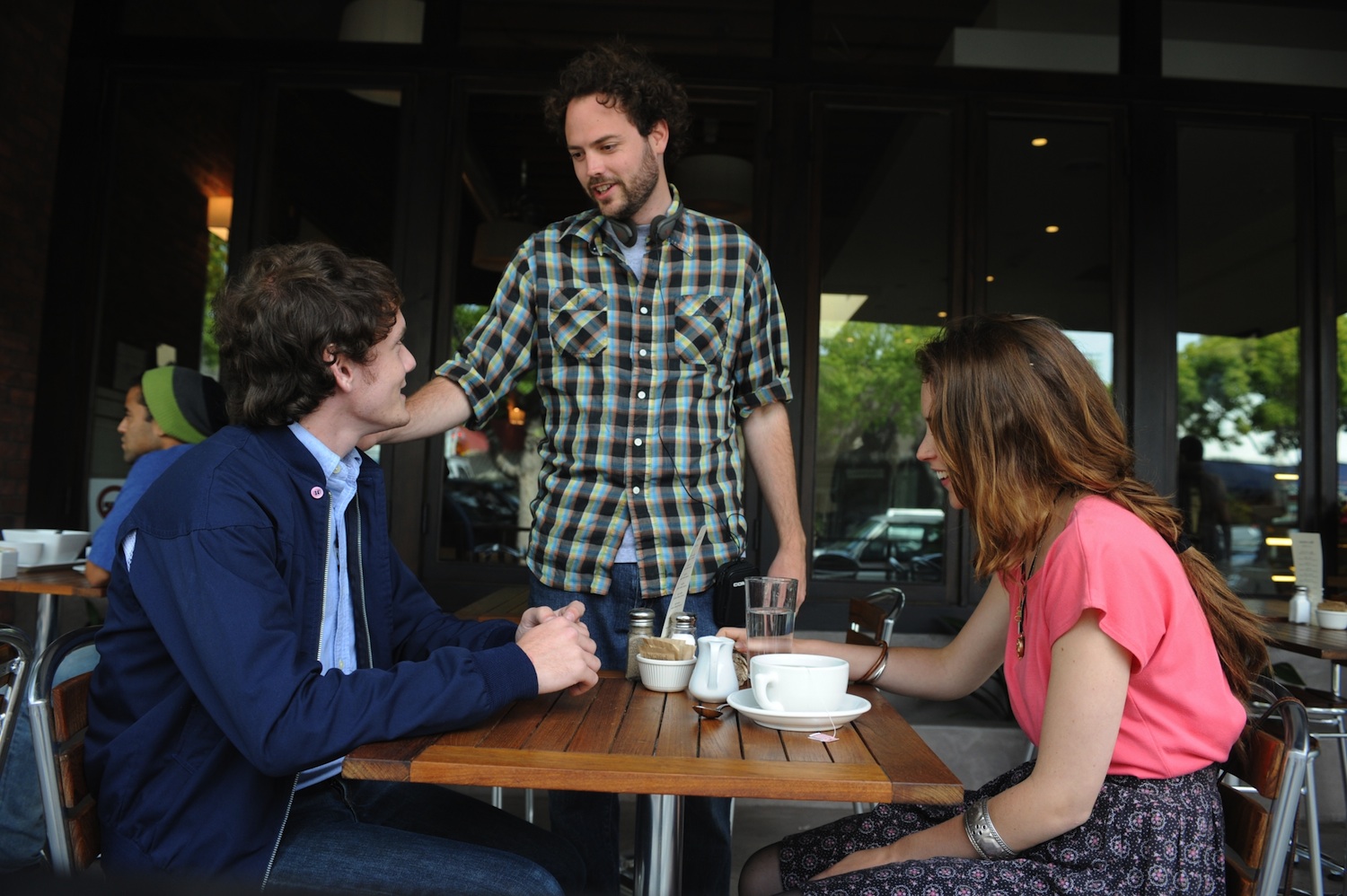
DRAKE DOREMUS (CENTER) WITH LIKE CRAZY STARS ANTON YELCHIN AND FELICITY JONES
PHOTO COURTESY OF PARAMOUNT VANTAGE
Rarely is a film released that actually challenges the conventions of filmmaking. To do so while also being highly entertaining is a minor miracle, and one that the Sundance jury recognized this year when it awarded Like Crazy the 2011 Grand Jury Prize. Even in a film such as Godard’s Breathless, one of the most famously highly improvised films in cinematic history, the director wrote certain lines of dialogue on set, shortly before shooting scenes. Like Crazy is just the third film from 28-year-old auteur Drake Doremus, who directed it not from a traditional screenplay, but from his 50-page outline, which incorporates not a single line of scripted dialogue.
The extraordinary actors—Felicity Jones (who won a Special Jury Prize at Sundance for her performance), Anton Yelchin, and Jennifer Lawrence (a Best Actress Oscar nominee for Winter’s Bone)—improvise the entire film, while Doremus’ fluid camera, as loose and soulful as a jazz riff, parallels the maverick screenplay with, for example, montages that convey the passage of time (in bed, in an airport) in wholly original takes. The entire effect is fresh, young, and groundbreaking, as it tells the remarkably authentic love story of two college students—Jacob (Yelchin), an American, and Anna (Jones), a Brit—whose relationship begins in LA but becomes a long-distance affair when Anna’s visa is revoked.
LORRAINE CWELICH: Tell me about your background. Where did you go to film school?
DRAKE DOREMUS: I went to the American Film Institute, in LA. It all started when I studied improv comedy when I was really little. My mother was a founding member of The Groundlings [the LA-based improv comedy troupe]. I started there, and then in film school, learned more of the traditional sense of filmmaking. When I graduated, I started working on a hybrid of the two things that I had studied. Ever since then, I’ve tried to work through that process. Spooner was scripted, but with a little bit of improv. It was kind of a thesis feature for me in a way; some things work about it, some don’t. And then with Douchebag, I started to really hone in on what the process is. That film was improvised off of a 40-page outline. And then Like Crazy was off of a 50-page outline.
CWELICH: Can you talk about writing the outline for Like Crazy?
DOREMUS: I like to think of it as being more specific and in-depth than a script is, because it’s got loads of back story and character development and subtext and scene objectives and character objectives and all these different things beated out within the piece. It’s like a short story, almost. And then it’s got all these other elements of filmmaking and character. What they’re thinking, what they’re going through, and it just reads out.
CWELICH: So you didn’t write actual lines of dialogue?
DOREMUS: Right, no lines of dialogue. Dialogue, to me, comes out of a function of knowing the characters and knowing the emotional objectives and knowing the beats of a scene. The dialogue is not as important to me; neither is the blocking. Those things come out of the knowledge of the moment and the preparation of the moment. Everything just sort of functions out of that.
CWELICH: How did you decide to cast Felicity and Anton in these roles?
DOREMUS: Anton was the first and only one I wanted to meet with, based on his previous work. I sat down with him for three hours and he was passionate about the way I wanted to make films; he got what I wanted to do. And the character is so different from me; he’s an introspective, thoughtful, almost passive-aggressive character and I really wanted the character to be not me, so that it wasn’t autobiographical.
CWELICH: And Felicity?
DOREMUS: I’d seen a bunch of different actresses, in LA and London. A bunch of tapes from London. I talked to her on the phone for an hour. We talked about performances that we loved, movies that we loved. She totally got it, and they she went back and videotaped two scenes that I asked her to do in her flat.
CWELICH: Which filmmaker most inspired you growing up?
DOREMUS: Lars Von Trier.
CWELICH: Is it accurate that the story was based on your relationship with your former wife, and if so, was that part of the reason you chose to write an outline rather than a traditional script?
DOREMUS: Yes, I think there were a lot of emotions I had, going through my own seven-year relationship, marriage and divorce, just sort of reflecting on my own feelings about it, but at the same time I really wanted to let it live on its own and let Jacob and Anna be their own characters and do their own thing. Anton and Felicity brought a tremendous amount to the characters and so did Ben [York Jones], my co-writer, he’s also been through a long-distance relationship. So really it started with mine but really grew out and became its own entity and own world.
CWELICH: How did they differ?
DOREMUS: I was in the relationship from age 18 to 25; she’s Austrian and not a journalist, so I changed all that. It’s very different in many ways, out of respect for her and for the relationship. A lot of the facts and emotions were maintained, but a lot of the specifics were different.
CWELICH: She also had a bracelet with “patience” inscribed on it?
DOREMUS: Yes, that’s true.
CWELICH: So you handed off the outline of the relationship to the actors; what were your instructions to them about to proceed with the improv?
DOREMUS: So many things Felicity brought to the movie, such as the poem, which she wrote herself. The story was very specifically planned out, but all of the dialogue was ad-libbed by the actors. Like in a book or short story, a lot of lines are in quotations, such as, “Anna quips, ‘How could you do that to me?'” So there’s that kind of dialogue, so to speak, in [the outline]. But the things they’re saying they’re not really planning, or authoring. The dialogue is authoring them. They’re so in the moment, they’re so Method about what’s going on, that the dialogue is coming as a function of what’s happening. And there are never marks on the floor, blocking out the scenes.
CWELICH: It’s an amazing leap of faith for a screenwriter to hand over the creation of dialogue to non-writers, to actors.
DOREMUS: I really do believe so much of a film is casting it right, and I think this is an extension of that. I think the more trust you put in actors, the more they are going to live it from the inside out, and the more it’s going to become personal to them, and the more they’re going to put into it.
CWELICH: Is that why you specifically chose to work in this manner?
DOREMUS: It is, but I also find that there’s a level of truth that comes from the performances that I’m sure other filmmakers are able to get but I don’t have the talent to; this is my way of understanding how to do that. I find that I can steal moments of truth when I let the camera roll and we guide things and shape it and fine-tune it and let it organically occur, rather than forcing the actors to stand here and say this.
CWELICH: No matter how effortless an actor makes their delivery of lines appear, it can’t be as natural as just speaking spontaneously.
DOREMUS: Because people stop and start in the middle of sentences. They rephrase what they’re saying. People interrupt each other. People talk on top of each other. These are truths about real life that I realized need to be in my films.
CWELICH: In the scene when they leave the immigration office, they are so frustrated and are like, “What do you want to do?” “I don’t know, do you want to go eat?” It’s exactly what people say in real relationships, but not what you usually hear in movies.
DOREMUS: That’s one of my favorite scenes. I don’t like to direct the actors by telling them what to do. If anything, it’s reminding them where they are in the movie, what’s happening emotionally and what they want in the scene. I’m interested, to be honest, more than anything in manipulating the moment, so that they feel exhausted. So the conversation I had with them before that scene in particular was running them in circles in their mind as to everything that’s happened. We had an in-depth discussion about it, so that by the time they did the scene, they were exhausted. I wanted them to feel exhausted, not to manufacture the emotion.
CWELICH: It really is Method to the extreme. Do you intend to work in the same manner for the foreseeable future?
DOREMUS: I just shot a movie this past summer in New York, that will be done in the spring, in the same manner, with Felicity Jones.
CWELICH: What’s the title?
DOREMUS: No title yet, but it’s Felicity again, Guy Pearce, and Amy Ryan. It’s a love story between a young woman and an older married man, who find connection at a very odd time in their lives. The film is about fighting those feelings and figuring out what to do with those feelings.
CWELICH: Where in New York did you shoot?
DOREMUS: Long Island, Oyster Bay, Sea Cliff area. It’s beautiful.
CWELICH: Do you decide to make a film based on theme?
DOREMUS: Yes, what I’m thinking about and where I’m at in my life.
CWELICH: How does music inspire you?
DOREMUS: When I was writing, I was listening to Paul Simon, M83, Marionettes, all the bands that were in the film. They became the fabric of the film.
CWELICH: What impact did winning the Grand Jury Prize have on you?
DOREMUS: I owe so much of my career to Sundance, giving me the platform to share my work over the past few years and for supporting me. It’s a really magnificent, special place to premiere a movie. The energy there is like no other festival in the world.
LIKE CRAZY OPENS TOMORROW.

